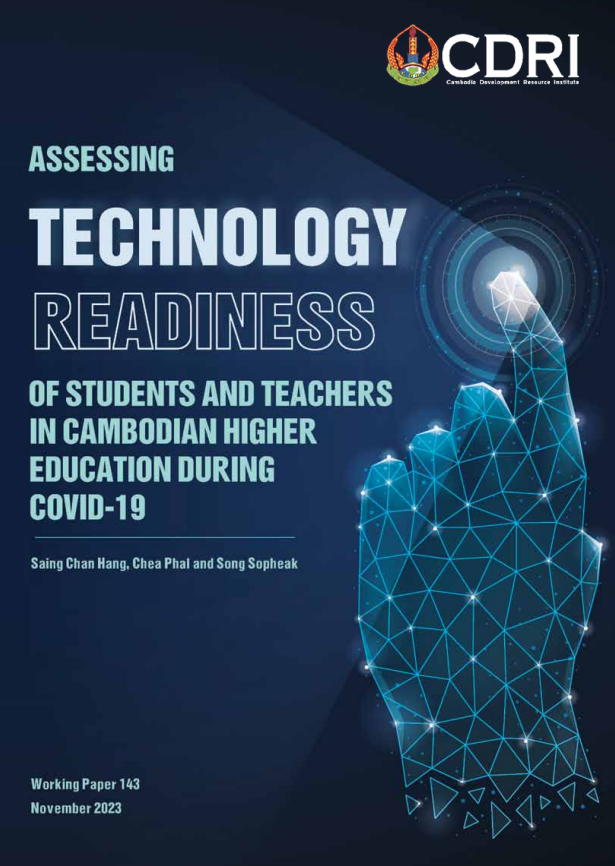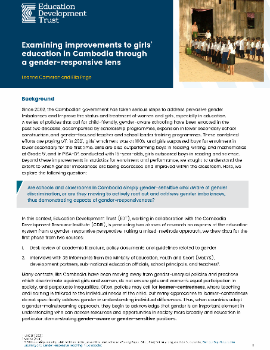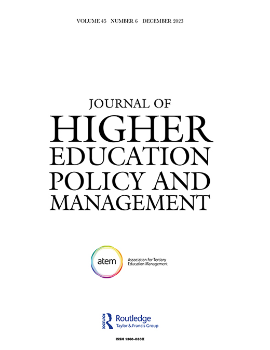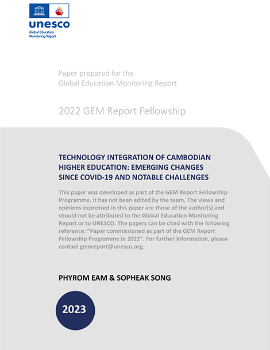
Assessing Technology Readiness of Students and Teachers in Cambodian Higher Education during COVID-19
Abstract/Summary
The global COVID-19 pandemic brought unprecedented disruptions to the higher education landscape worldwide. Widespread school closures, driven by the imperative of social distancing to combat the virus's spread forced a rapid and dramatic shift from traditional face-to-face instruction to online learning and teaching environments in numerous countries. Recent research has highlighted the formidable challenges lower- and middle-income countries face, particularly those with weaker ICT infrastructures and less technology-ready teachers and students, when adapting to these new tech-enhanced teaching and learning modalities. As a lower-middle-income country, Cambodia encountered its own challenges, most notably technology readiness, as it embarked on the journey of adopting online learning and teaching. Cambodian efforts to integrate ICT in education began in 2004, culminating in promulgating the 2010 Master Plan for ICT in education for 2009-2013.
This study aimed to contribute to the growing body of literature on technology readiness among educators and students amidst the forced transition to online learning during the COVID-19 pandemic. Its overarching goals were to provide insights into technology readiness levels, its determinants, and regional disparities. To assess these aspects comprehensively, two independent surveys were conducted between June and July 2020 gathering responses from 370 teachers across 18 HEIs and 1,338 students from 22 HEIs in Cambodia.
Findings from this study illuminated how educators and students adopted online learning and teaching at a slow pace in the pre-pandemic era. This sluggish adoption was attributed to a combination of factors, including a lack of motivation, inadequate support, and limited funding for HEIs to transition to e-learning environments. Nevertheless, when the pandemic necessitated a rapid shift, nearly all teachers and students embraced online learning and teaching irrespective of their levels of technology readiness. Concerns emerged as a significant portion of students reported dedicating only one to two hours daily to online classes, potentially resulting in learning loss. Furthermore, less than one-third of students expressed satisfaction with online learning and a minority favouring it over traditional approaches. Strategies such as ensuring access to necessary ICT tools, providing conducive study environments, and offering personalised support for e-learning modes become paramount to mitigate learning loss.
This study utilised the technology readiness measure developed by Parasuraman and Colby (2015) to understand how teachers exhibited greater technology readiness than students. Teachers displayed higher levels of optimism and motivation, with a larger proportion falling into the explorer and pioneer categories with a smaller percentage identified as sceptics. These findings underscored the pivotal role of teachers' accumulated ICT experience and positive attitudes toward technology in enhancing their technology readiness. Strategies aimed at bolstering students' ICT skills and reshaping their perceptions, particularly among those identified as sceptics, are recommended to address these disparities.
Furthermore, regional disparities in technology readiness were evident among both teachers and students. Urban educators were more inclined to be pioneers and less prone to hesitancy compared to their non-urban counterparts. Similarly, urban students were more likely to exhibit explorer and pioneer characteristics and less likely to be sceptics when contrasted with their rural peers. This regional variance highlights the importance of tailoring technology integration strategies to attract both teachers and students in different geographical contexts. Gender differences in technology readiness were also evident. Male teachers and students displayed higher readiness levels than their female counterparts. Specific interventions targeting female students and educators alongside mentoring and support programs should be implemented to address these gender disparities.
Lastly, the study delved into a quantitative analysis of technology readiness determinants among teachers and students during the COVID-19 pandemic. Factors influencing technology readiness among teachers encompassed birthplace region, tablet ownership at home, the percentage of teaching time involving ICT tools, perceived benefits of ICT usage in teaching, general ICT competency, ICT-related training experience, and perceptions of school ICT infrastructure and policies. In contrast, student technology readiness was influenced by variables such as gender, English language proficiency, home assets, tablet ownership, prior online class experience, satisfaction with online learning during the pandemic, and the average daily hours spent online.
In navigating the ever-evolving landscape of education in the digital age, this study underscores the importance of comprehensively addressing technology readiness across several areas. Based on the research findings, a set of recommendations is proposed to enhance technology readiness and better facilitate the transition to online learning within Cambodia's HEIs. Firstly, these initiatives should prioritise student preparedness and support by offering incoming students with pre-requisite ICT skills training, orientation sessions, and dedicated support services. Second, efforts to enhance English language programs within HEIs can significantly improve language proficiency and technology readiness among students. Third, it is also important to ensure equitable access to technology, mainly by providing tailored assistance to students from lower socio-economic backgrounds and guaranteeing widespread internet access, especially in rural areas. Fourth, advocating for the integration of ICT tools into the curriculum and promoting digital teaching methods that align with student preferences should be prioritized. Fifth, it will be crucial to develop comprehensive training programs for teachers encompassing a wide range of ICT skills and emphasising practical applications within their teaching practices. Sixth, addressing gender and regional disparities in technology readiness requires specialised interventions and mentorship programs. Lastly, promoting research and innovation initiatives will facilitate the identification of emerging trends and innovative approaches tailored to Cambodia's unique educational context.



